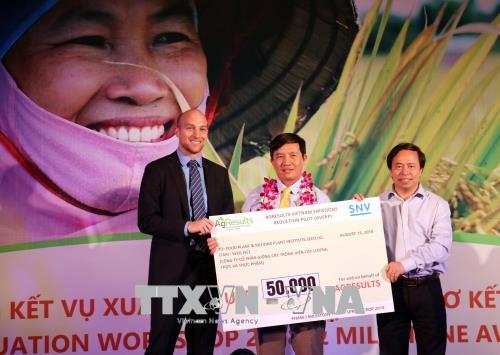
The AgResults Vietnam Emissions Reduction Pilot (AVERP) awarded three agricultural technology projects verified to be most efficient in reducing greenhouse gas (GHG) emissions and increasing rice yield during a conference in Thai Binh on August 15.
award ceremony (Source:
VNA)
The conference was co-held by
the non-profit SNV Netherlands Development Organisation and the local
Department of Agriculture and Rural Development in the northern province to
review the spring rice crop and award winners of the project’s first phase.
The three winners received prizes worth a total of 100,000 USD. Of the amount,
50,000 USD was given to the first prize winner – FARI-SEED JSC, a member of
Field Crops Research Institute.
TheAgResultsVietnam Greenhouse Gas Emissions Reduction Pilot is a
four-year, 8-million-USD results-based financing project that aims to test and
scale up innovative technologies, tools, and approaches to reduce GHG emissions
in the land cultivation and production stages for rice, while also increasing
yield, reducing poverty, protecting the environment, and combating the effects
of climate change.
The AVERP project is conducted in two phases in the Red River Delta’s Thai Binh
province. The first phase of the project took place over two rice crops, during
which selected organisations tested their technologies. Six out of 11 competing
organisations were selected to go through to the second phase.
The project’s Phase II will begin in spring 2019 and consists of four
consecutive crops, during which organisations will scale their proven
technology to reach the greatest number of smallholder farmers. Participating
organisations will be paid based on their results achieved in both phases.
Its objectives are to reach 75,000 farm households in Thai Binh, reduce 375,000
tonnes of CO2 emissions, and save about 15 percent of costs for smallholder
farmers due to lower input use.
Source: VNA
The emulation movement "Hoa Binh joining hands to build new-style rural areas” has been widely spreading, becoming a driving force that motivates the localities to renew rural landscapes and improve the material and spiritual lives of the residents. In this movement, the people play a central role-both as the main implementers and direct beneficiaries of its outcomes.
In response to the global digital revolution, Hoa Binh Newspaper is transforming itself into a modern and multi-platform media hub, blending cutting-edge technology with a restructured newsroom and a new generation of tech-savvy journalists.
Hoa Binh province’s Association of the Elderly recently held a conference to review the project on expanding the inter-generation self-help club model until 2025.
In a move to implement Resolution No. 57-NQ/TW, issued on December 22, 2024 by the Politburo, which targets breakthroughs in science-technology development, innovation, and digital transformation, the Hoa Binh provincial Department of Health has issued a plan to roll out the "Digital Literacy for All” campaign within the local health sector.
An Nghia Commune (Lạc Sơn District) is one of the communes that achieved the tha standard of the national new rural area in 2018. Entering a new development phase, the commune is now trying to meet the criteria for the advanced new rural development. With the strong political will and the public consensus, the commune is gradually overcoming the challenges to reach this goal, aiming for the sustainable development.



